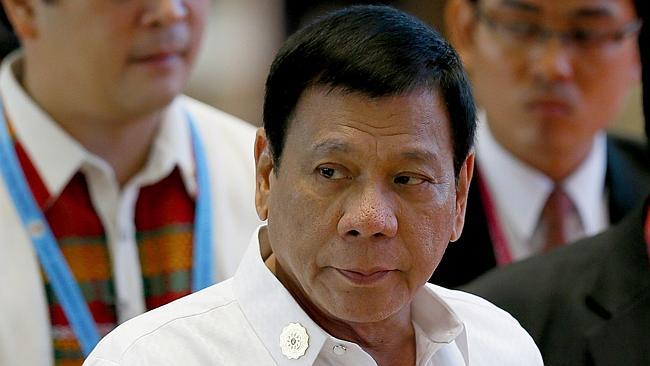Duterte ‘concerned’ as vigilantes or rival drug dealers kill 1500
A total of 2956 people have been killed in the war on drugs — 1466 by law enforcement and 1490 by unknown assailants.

The deaths of almost 1500 suspected drug dealers by possible vigilante groups or rival drug pushers in seven weeks is “cause for concern”, a spokesman for Philippine President Rodrigo Duterte says even as the palace declares its war on drugs a “success”.
The latest statistics from the Philippine National Police reveal a total of 2956 people have been killed — 1466 by law enforcement officers and 1490 by unknown assailants — since Mr Duterte took office in late June, promising to feed the fish in Manila Bay with the bodies of drug pushers and criminals.
National police chief Ronald dela Rosa said the supply of illegal drugs, including crystal meth, or Shabu as it is known in The Philippines, had been cut by 90 per cent since the operation began.
Responding to questions about the body count, Philippines presidential communications secretary Martin Andanar said: “The police operations have been a success.
“But the killings that have something to do with gang wars or internecine since they eliminate each other, of course that is a cause for concern.
“These do not fall under the ambit of the law.”
Mr Andanar said authorities were now investigating those deaths suspected to be the work of vigilantes or rival drug gangs.
It is the second time since Mr Duterte, a former public prosecutor and long-time mayor of southern Davao City, took office that the Malacanang Palace has expressed concern over the suspected extrajudicial killings that have drawn widespread condemnation, from human rights groups to allies.
Just five days after Mr Duterte’s inauguration on June 30, a presidential spokesman said the rising body count — then about 23 — was a cause for concern, and that the President was “very well aware” that the campaign against drugs must be carried out within the parameters of the law.
Yet the killings have continued apace, with the bodies of slain alleged drug dealers turning up nightly — some of them with warning signs pinned to their clothing, or their heads wound tightly in packing tape.
The rising body count prompted top human rights lawyers Jose Manuel Diokno to warn in July that Mr Duterte’s campaign had “spawned a nuclear explosion of violence that is spiralling out of control and creating a nation without judges”.
But officials say most of the drug offenders killed in law enforcement operations died while resisting arrest. They point to the detention of more than 16,000 drug suspects, and the voluntary surrender of a reported 70,000 drug users as proof of their success.
Mr Duterte has on numerous occasions said he would pardon police if they were charged with human rights violations for carrying out his merciless orders, and also appeared to incite civilians to take the law into their own hands.
Two weeks ago General dela Rosa reiterated that message, telling a meeting of 1000 surrendered drug users that they could kill their drug pushers.
“You can kill them because you are the victims,” he said. “Go to them, pour gasoline on their houses and burn them down. Show them your anger.”
A more tempered Mr Duterte said over the weekend his “campaign against illicit drugs will be relentless, and it will be comprehensive, encompassing suppression, prosecution and rehabilitation.
All these measures are within the bounds of our laws”.
The President made international headlines ahead of last week’s G20 East Asia Summit for allegedly referring to Barack Obama as a “son of a whore” and warning he would not be lectured on human rights by the US President.
The comments led to the cancellation of the two leaders’ planned meeting on the sidelines of the Laos meeting.
Mr Duterte also drew criticism for calling the UN secretary-general a “fool” for criticising human rights violations in The Philippines.
In August he threatened to leave the UN after it called for an end to drug-related extrajudicial killings.



